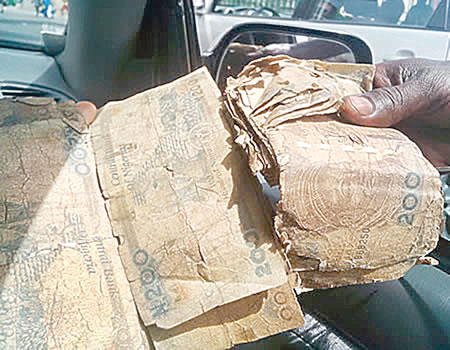There has been a public outcry over the state of currencies in circulation as some Nigerians worry about the health implications and the accompanying national shame. Many bankers who normally hoard new notes to sell to currency hawkers accuse the Central Bank of Nigeria (CBN) of either failing to issue new notes or even charging exorbitantly for the exchange of old notes for new ones. Nigerians love new, crisply minted naira notes. They love the smell; they love the feel. Incidentally, they also love to treat currency notes very shabbily. This is seen in the way they throw it carelessly at unending parties marking funerals, birthdays, child naming, house-warming, graduation and other occasions. Bank officials make brisk business, ‘selling’ new notes to customers and especially currency hawkers. At major streets around the country, hawkers of new notes make good profit as they exchange N10,000 worth of brand new naira notes for N13,000 old notes at high flying parties. Incidentally, soon as they purchase the new notes, they throw it at celebrants who make a show of dancing on the money even on dirty ground. At the end of the dancing time, notes which nylon was peeled off few minutes ago would have become dirty and sometimes mutilated. According to CBN Acting Director, Corporate Communications, Isaac Okorafor, “people are fond of abusing these denominations by spraying them to be stepped on during weddings and other ceremonies. The abuse is even worse during the festive season.” Okorafor who also disagreed with insinuations that the apex bank had stopped issuing lower currency denominations and that they are short in circulation said “It is not true. We have been printing lower denomination notes. A combination of currency abuse and the fact that the N100 note has high velocity of circulation has contributed to the faster wear and tear.” He disclosed that CBN was coming up with measures to deal with the problem.”
It is always also a shame seeing how mechanics, butchers, commercial drivers, bus conductors and market women treat the currency. Market women, aside squeezing the notes also cut the tips as a form of talisman to prevent evil forces from removing it from vanishing from their purses.
Cost of maintenance
In June 2017, CBN Assistant Director, Currency Operations, Benedict Maduagwu revealed that the apex bank spent N192 billion between 2005 and 2010 on the maintenance of currency. “As I speak to you, the figure would have grown much more than that,” he said in Lagos while urging Nigerians against handling of the naira.
Also, financial payment solutions firm, Mastercard’s study showed that countries across the globe spend an average of one per cent of their GDP yearly to fund minting of currency notes and logistics involving handling, processing and shipment. According to MasterCard Vice President & Head of Area Business, West Africa, Mrs Omokehinde Ojomuyide “MasterCard advisers have done studies in many countries and found out that the cost of cash to an economy is about one per cent of the country’s GDP. The studies show that countries spend from 0.5 to 1.5 per cent of their GDP.” In essence, Nigeria was spending up to $5.1 billion with GDP figures of $510 billion. And when it is considered that the 3,030 MW Mambilla Hydro Electricity Project is costing Nigeria a total of $5.792 billion, the import of spending such amount on maintaining currency annually will begin to sink.
Yet, deposit money banks are reluctant to share the responsibility of maintaining the currency with the apex bank. A director at the CBN told our correspondent that going by international standards, each currency note has a life span but the dependence on cash transactions by majority of Nigerians shorten such life span. According to him, CBN ensures that once a dirty note gets into its system, there is a machine that separates it from good notes and never returns to the public but that commercial banks don’t do this. “It is the policy of the CBN to ensure that clean notes are issued into circulation,” but that dirty notes continue to circulate because deposit money banks refuse to remove them.
“The banks are expected to bring back for counting and destruction of the dirty old notes, but they prefer to recycle these notes, therefore, when people go to banks to withdraw their money, what they get is a mixture of mutilated, dirty notes. The director also gave some reasons why the commercial banks did not change dirty notes to new ones but rather prefer to recycle them. The banks are expected to pay some charges for sorting and changing dirty notes for them by the CBN. This price is from N3, 000 upwards, but banks do not like to pay these charges, yet no central bank in the world does it free of charge. “The banks do not want to change old notes because the financial cost of changing is what they are looking at. The private sector is very averse to cost,” he said.
Alternative payment channels to the rescue
Several socio-economic reasons have been adduced for the need to reduce cash in circulation. Some of them include insecurity, high risk of moving hard currency from one location to the others, risks involved like fire, flooding and accidents building collapse. Unbridled cash transaction also promotes kidnapping, election rigging, revenue leakage, Inefficient treasury management, corruption in addition to attendant economic instability such as inflation. There is also the issue of high cost of minting and circulating currencies through the nooks and crannies of the country. To stem this menace, CBN has introduced several alternative means of making payments. Banks have also joined by embarking on several innovations which are making it easier and convenient for Nigerians to transact businesses.
In January 2012, the apex bank launched the innovative cashless policy, which seeks to inculcate a tradition of citizens traveling light by carrying only their credit, debit cards or even their mobile phones. It limits the amount of daily cash that individuals or corporate entities can withdraw from the bank.
Some of the alternative channels of transaction currently in use include PoS Terminals with the advantage that they recognise all available credit and debit cards as they are: card neutral (Interoperability). Improved internet connectivity; greater reach/deployment and settlement in 24 hours make it attractive to use also make PoS terminals attractive.
Others include mobile payment options; multi-functional ATMs that enable cash withdrawal, cash-deposit, bill payments, funds transfer are available and are being actively spread nationwide; internet banking: Intra and Inter Bank funds transfer are very widely available and are very reliable and convenient for use; electronic funds transfer: NIBSS has on offer the NIBSS Instant Payment (NIP) product and the NIBSS Electronic Funds Transfer (NEFT). These products have revolutionised funds transfer in the banking industry with quicker value for inter-bank transfers; direct debits: automated direct debit option available in banks and some billers.
Benefits of alternative payment systems
A wide acceptance and use of alternative payment systems is likely to benefit every stakeholder including governments, consumers, customers, corporations and banks.
Governments for instance will have firmer grip on monetary policy, and its attendant effect on Inflation and economic stability. There will also be increased and transparent tax collection; greater financial inclusion; all leading to increased economic development,
Consumers on their part will experience faster and easier payments; increased convenience and access since they will have more payment options) and there will be a reduced risk of robbery.
In the case of corporations, there are better access to capital due to shorter payment processing times; increased efficiency of payment processes and accounting; reduced revenue leakages; and more efficient treasury management. Since the introduction of electronic payment channels, banks have been more efficient as it is faster, easier and more efficient to do their processing; their cost of operations as per handling of cash has reduced.
Challenges
There is no doubt that the introduction of alternative mean of payments has reduced the amount of physical cash in circulation but the entrenched culture of moving with cash is certainly proving difficult to eliminate especially because of corruption. The envisaged attitudinal changes expected from the public removes people from their comfort zone. This discomfort and the lack of clarity as well as understanding had hampered full adoption and fueled conspiracy theories amongst the public. Also a lack of understanding of benefits of alternative payment channels amongst the banked and unbanked; resistance due to prevailing cash culture; fear of technology; illiteracy (Literacy vs Numeracy); entrenched poverty since no one can spend what he does not have; inadequate infrastructure; distrust in banking system; lack of clarity in communicating content of policy; merchant apathy, manifesting in merchants not wanting to pay commission to banks and staff who discourage electronic payment in order not to lose what they added to the normal price are some of the challenges facing a full embrace of cashless policy.
Since 2012 when the policy was fully introduced, however, more Nigerians have embraced it. Both monetary and fiscal authorities still have the responsibility to continue to enlighten members of the public to embrace the policy. A universal embrace of alternative payment methods will certainly eliminate the indignity of carrying dirty, mutilated and even counterfeit currency notes.






